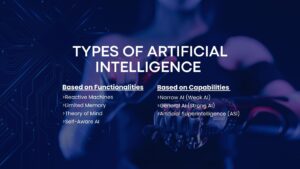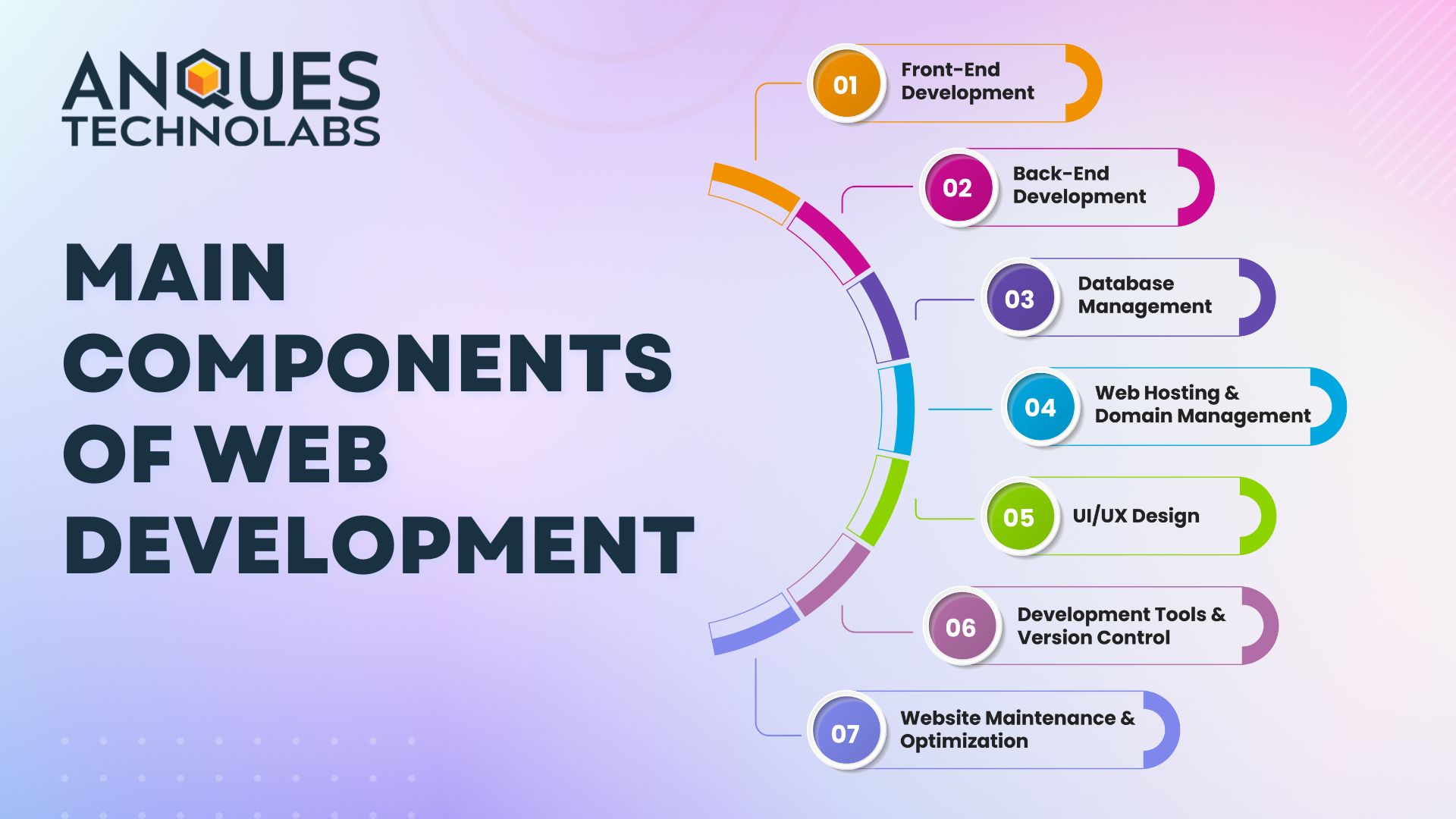In today’s competitive world, success comes from using the power of Artificial Intelligence. AI and ML development are changing how businesses operate, making processes more efficient and helping companies grow. AI tools and technologies have become more accessible and affordable, allowing businesses of all sizes to benefit from them. Understanding the different types of AI and how they can be applied to your business can help you stay ahead of the competition and drive growth.
What is Artificial Intelligence?
Artificial Intelligence is a branch of computer science that focuses on creating machines and software capable of performing tasks that typically require human intelligence. These include problem-solving, understanding of language, pattern recognition, experience-based learning, and decision-making. AI aims to simulate human cognitive functions, allowing machines to perform complex tasks with minimal human intervention. AI has found applications in nearly every industry, including:
- Healthcare
- Banking
- Manufacturing
- Education
- Agriculture
- E-Commerce
- Entertainment
Now that we understand the basics of AI, let’s look at the different types of artificial intelligence.
Types of Artificial Intelligence
Artificial Intelligence (AI) can be categorized in different ways, focusing on both capabilities and functionalities. These classifications help us understand the different stages of AI development and its potential applications:
3 Main AI Types by Capabilities:
- Narrow AI (Weak AI)
- General AI (Strong AI)
- Artificial Superintelligence (ASI)
1. Narrow AI (Weak AI):
- Narrow AI is specialized in performing a single task or a limited range of tasks. It is designed with a specific purpose in mind and operates under a predefined set of conditions.
- Example : Include voice assistants like Siri and Alexa, facial recognition systems, and customer service chatbots.
2. General AI (Strong AI):
- Any intelligent work that a human can complete would be accomplished by general artificial intelligence. It would possess the cognitive abilities needed to understand, learn, and apply knowledge in diverse situations, similar to the human brain.
- Example :Currently, general AI is hypothetical and does not exist. It represents the goal of creating machines that can think and reason independently across various domains.
3. Artificial Superintelligence (ASI):
- Artificial Superintelligence refers to a future AI that surpasses human intelligence in all areas, including creativity, decision-making, and problem-solving. It would be far more advanced than the most intelligent humans.
- Example :This type of AI is purely theoretical at this point and is often discussed in the context of potential future scenarios where machines might outperform humans in every way.
4 Main AI Types by Functionality :
- Reactive Machines
- Limited Memory
- Theory of Mind
- Self-Aware AI
1. Reactive Machines:
- Reactive machines are the most basic type of AI. They can only react to specific inputs and produce pre-determined outputs. They do not have the ability to form memories or learn from past experiences.
- Example : IBM’s Deep Blue, a chess-playing computer that could evaluate millions of possible moves but had no memory of previous games.
2. Limited Memory :
- Limited memory AI systems can use past experiences to make decisions. They have a memory that allows them to store previous data and predictions.
- Examples: Self-driving cars, which observe other vehicles’ speeds and directions, then adjust themselves accordingly.
3.Theory of Mind :
- This type of AI would be able to understand emotions, beliefs, and thoughts of humans or other entities. It’s still in the research phase and aims to create machines that can engage in social interactions.
- Examples: Future AI systems capable of interacting with humans on a more personal and empathetic level.
4. Self-Aware AI :
- Self-aware AI represents the most advanced form of AI, where machines have consciousness, self-awareness, and the ability to perceive their own existence. This type of AI does not exist yet and remains a theoretical concept.
- Examples: The idea of AI with self-awareness, where a machine could potentially have its own thoughts, desires, and possibly emotions.
How to Develop AI for Business Success?
Developing AI for business success involves a strategic approach that starts with understanding your specific needs. Begin by identifying the areas where AI can provide the most value, whether it’s improving customer service, automating tasks, or analyzing data.
Once you have a clear objective, gather and prepare the necessary data. High-quality, relevant data is crucial for training effective AI models.
Next, select the right AI tools and technologies that fit your requirements. Depending on your goals, you might need machine learning algorithms, natural language processing, or other AI technologies. Develop and test AI models using these tools to ensure they meet your business needs.
Integrate the AI solutions into your business processes. This could involve automating routine tasks, enhancing customer interactions, or improving decision-making. Make sure to monitor the performance of these AI systems regularly and adjust them as needed to maintain effectiveness.
Lastly, train your team to work with AI. Providing education on how to use AI tools and leverage their capabilities will help maximize their impact on your business.
By following these steps, you can develop AI that enhances your business operations and drives success.
FAQs:
1. What is an AI model?
An AI model is a computer program that learns from data to perform tasks. It looks for patterns and makes decisions or predictions. For example, it can predict what customers might buy or suggest products based on their past behavior.
2. How can Narrow AI benefit my business?
Narrow AI can help your business by automating tasks, boosting efficiency, and offering data-driven insights. It can improve customer service, streamline operations, and support better decision-making.
3. What are the benefits of using AI for customer service?
AI improves customer service by providing quick responses, handling multiple inquiries at once, and offering 24/7 support. It also helps personalize interactions and gather useful customer insights.
Conclusion:
In conclusion, integrating the right types of artificial intelligence into your business strategy can significantly enhance growth and efficiency. Whether you’re leveraging machine learning for data-driven insights, natural language processing for improved customer interactions, or automation to streamline operations, AI has the potential to transform how your business operates and competes in the market.
To harness these benefits effectively, it’s crucial to partner with experts who can guide you through the complexities of AI implementation. Anques Technolabs offers specialized services to help businesses like yours integrate AI solutions tailored to your needs. With their expertise, you can navigate the AI landscape confidently and position your business for long-term success.















